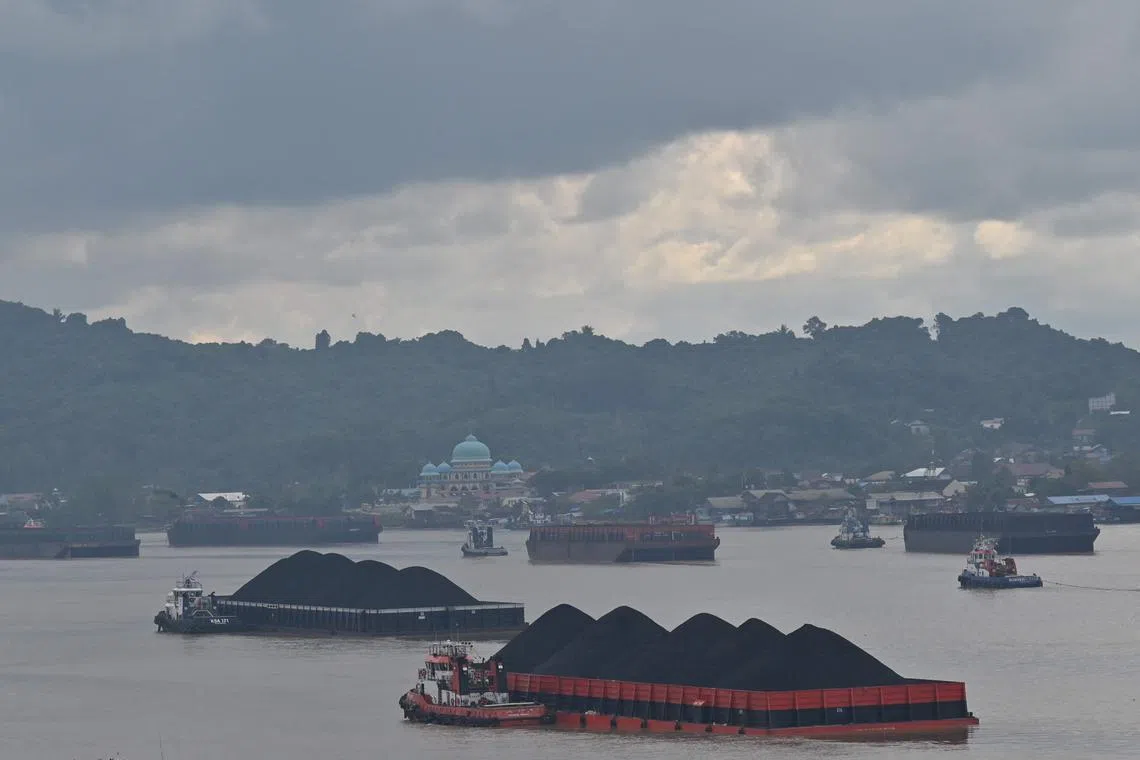US, Japan and partners mobilise $27 billion to move Indonesia away from coal power
Sign up now: Get ST's newsletters delivered to your inbox

Indonesia has committed to capping power sector emissions at 290 million tonnes by 2030.
PHOTO: AFP
SHARM-EL-SHEIKH, Egypt - A global group of nations including the United States and Japan will provide Indonesia with US$20 billion (S$27.4 billion) in public and private finance to help South-east Asia’s largest economy accelerate shifting its coal-dominated power grid from the polluting fossil fuel.
The deal, known as the Just Energy Transition Partnership (JETP), will help the country ramp up its use of renewable energy and help workers in the polluting coal sector to transition to clean-energy jobs.
It also aims to help Indonesia’s power sector peak its emissions by 2030.
The agreement, announced during the Group of 20 leaders’ summit in Bali, is a boost to efforts at the COP27 United Nations climate talks in Egypt to cut greenhouse gas emissions and shift the world to greener energy.
The JETP plan is modelled after a US$8.5 billion deal with South Africa, which was announced during the UN climate talks in Glasgow in 2021. That deal was formally endorsed at the United Nations COP27 climate talks in Egypt last week by the US and South African governments.
The plan identifies focuses on clean energy, electric vehicles and green hydrogen investment needs in South Africa. It also lays out a roadmap for building clean energy infrastructure in a way that supports displaced coal miners and affected communities.
Talks are ongoing for similar JETP deals to be rolled out in India, Senegal and Vietnam.
The US$20 billion Indonesia JETP will be split roughly 50/50 between public and private finance.
An initial US$10 billion in public funding will be provided over a three-to-five year period and is contingent on the country peaking and limiting power sector emissions at 290 million tonnes by 2030.
The new targets would be 25 per cent lower than the current estimated peak in 2037, with Indonesia planning to reduce emissions by over 2 billion tonnes through to 2060, when it aims to reach net zero,
The funding will be provided by the International Partners Group, co-led by the US and Japan, and also involving Canada, Denmark, the European Union, France, Germany, Italy, Norway and the United Kingdom.
In a statement, US Special Presidential Envoy for Climate John Kerry said: “We’ve built a platform for cooperation that can truly transform Indonesia’s power sector from coal to renewables and support significant economic growth.”
“At every step, Indonesia has communicated the importance of building a clean economy that works for the people of Indonesia and attracts investment.”
Indonesia is the world’s top thermal coal exporter, and is heavily dependent on coal for power generation. In recent years, the country has dramatically expanded its fleet of coal power plants at an environmental and health cost.
An additional US$10 billion in private capital will also be mobilised by the Glasgow Financial Alliance for Net Zero (GFANZ) Z – the world’s largest coalition of financial institutions.
“With collective ambition by all parties, including using public financing catalytically to crowd in private finance, the initial US$10 billion commitment by the public sector has the potential to generate significantly more in private finance,” said GFANZ in a separate statement on Tuesday.
It added that a working group of global financial institutions, comprising the Bank of America, Citi, Deutsche Bank, HSBC, Macquarie, MUFG, and Standard Chartered – have been identifying barriers needed for sourcing the necessary private investment, advocating for the reforms necessary to address those barriers, and identifying approaches that could help crowd in private finance at scale.
The announcement comes a day after the Asian Development Bank (ADB) and the Indonesian government announced they will be working together to refinance the 660-mefawatt Cirebon 1 power plant
The agreement, the first for Indonesia under the ADB’s Energy Transition Mechanism (ETM), will combine private investment funds, public finance and philanthropic donations to buy up or refinance coal power plants in South-east Asia.
Speaking to The Straits Times on Monday, ADB’s Special Senior Adviser (Climate Change) Warren Evans said the JETP will involve setting up a framework detailing how a just energy transition can be carried out in each nation.
While the full details of the JETP are being worked out, the ETM will be piloted at a small scale to determine if the model is suitable for coal plant retirement in Indonesia and refinancing them.
If feasible, the ETM model can then be scaled to more coal plants, and could be adopted as a model by the JETP to accelerate decarbonisation and bring about a just energy transition on a larger scale.
According to a leaked draft of the JETP plans for South Africa, some $4.6 billion of the $8.5 billion – or around 54 per cent – has been earmarked as concessional loans, which helps ensure the borrowing terms are more favourable for South Africa.
The rest is made up of commercial loans and investment guarantees to de-risk projects to attract private investors. Only US$230 million – or less than 3 per cent – is made of grant money.
Dr Sandeep Pai, a senior research lead with the Global Just Transition Network at the Center for Strategic and International Studies (CSIS), said the JETP funding would likely come from concessionary loans, and that Indonesia is already negotiating with the Climate Investment Funds programme and the Asian Development Bank on concessionary finance for its coal phaseout.
While adequate funding is available through various multilateral banks for coal plant decommissioning, a “just transition” for workers and communities would require sufficient grant funding, he added.
The US officials said that public finance would include concessional lending and equity, as well as some grants.
The US will work with Indonesia to map out a 90-day plan to set up a secretariat to run the initiative and for Indonesia to reform its policies, such as streamlining permitting and setting up a competitive procurement process to make the targets achievable.
South Africa has said the scale of funding it requires to phase out its coal was much higher than the funding mobilised through its JETP mechanism.
The US State Department official said it had learnt some lessons and had engaged local partners from the outset to “move as fast as possible”.



